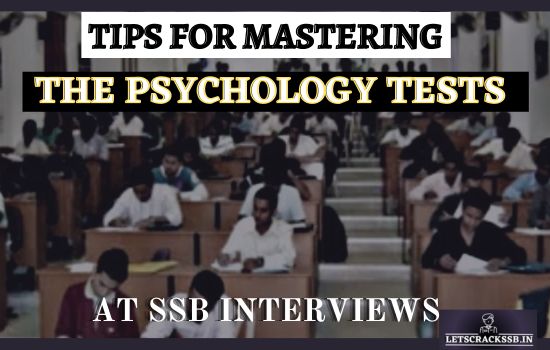6 Tips for Mastering the Psychology Tests at SSB Interviews
Becoming a part of the armed forces is a dream for many, and the Selection Services Board (SSB) interview is the way to make that dream come true. One of the most important parts of this interview is the psychology tests. These tests dig deep into a candidate’s mind to see if they’re a good fit for the challenging life in the armed forces. In this article, we’ll talk about how to do well in these psychology tests during SSB interviews.
Understanding the Psychology Tests: Checking Many Aspects
The psychology tests in SSB interviews check the mental qualities needed for a successful military career. They look at things like leadership skills, how well you can get along with others, decision-making abilities, how emotionally stable you are, and how well you can communicate. These tests involve different types of exercises which are written in nature – all meant to reveal different parts of who you are.
Below are four tests that are conducted as part of psychological tests at SSB Interviews.
Thematic Apperception Test (TAT)
In TAT, you’ll see pictures and need to make up stories about them. These stories show how you think, what you imagine, and how you solve problems. You have to write 12 stories, for which there will be 11 pictures and the last story will be based on a blank picture – which can be any story. You will get around 4 minutes to write the story.
To understand TAT in detail and how to perform your best in TAT – do check the following article.
TAT at SSB Interview | How to write the best Thematic Appreciation Test Stories
Word Association Test (WAT)
WAT gives you random words, and you have to say the first thing that comes to your mind. This shows how you think, how stable your emotions are, and what attitudes you have. There will be 60 words for which you will get around 30 minutes in total.
To understand WAT in detail and to give your best in WAT – do check the following article.
Word Association Test (WAT) at SSB Interview (400+ New Words)
Situation Reaction Test (SRT)
SRT gives you made-up situations and asks how you’d react. This helps them see how you make decisions, solve problems, and handle tough situations. There will be 60 situations in total for which you will get around 30 minutes.
To understand SRT in detail and to give your best in SRT – do check the following article.
Situation Reaction Test (SRT) at SSB Interview (60+ New Situations)
Self-Description Test (SD)
In SD, you write about yourself – your strengths, weaknesses, what you like, what you don’t, and your dreams. This lets them see how well you know yourself and how you express your thoughts.
To understand SD in detail and to give your best in SD – do check the following article.
How to write the best Self Description at SSB Interview
Succeeding in the Psychology Tests: How to Do It
Be Yourself
The psychology tests are about seeing who you really are. It’s important to be genuine and not try to act in a certain way. Show your true thoughts and feelings, while also remembering the values the armed forces hold.
Practice Regularly
Practicing is a must for these tests. Do mock tests, solve practice questions, and join practice sessions. This builds confidence, makes you quicker in responding, and sharpens your thinking. Knowing the test formats and types of questions will also make you less nervous during the actual tests.
Do check the below practice set to practice on a regular basis.
- TAT Practice Set
- WAT Practice Set
- SRT Practice Set
- Sample SD Set
Tell Stories Well
For tests like TAT and WAT, being able to tell stories is important. Practice making up good stories quickly. Make your stories interesting with different angles, emotions, and outcomes to show your personality.
Stay Positive and Logical
In tests like SRT, keeping a positive and logical mindset is key. Focus on finding solutions instead of getting stuck on problems. Think logically, consider different viewpoints, and aim for balanced and practical answers.
Manage Stress
These tests can be mentally tough and cause stress. Practice techniques like deep breathing, mindfulness, and visualization to stay calm during the tests. Being calm and focused helps you think better and make better decisions.
Stress Management: Ways to Prevent and Relieve Stress (webmd.com)
Learn from Your Practice
After practicing or doing mock tests, take time to think about how you did. Find where you can improve, look at your answers, and understand why you said what you did. By constantly assessing yourself, you can get better over time.
In the end, doing well in the psychology tests in SSB interviews comes down to knowing yourself, preparing, and being genuine. These tests aren’t meant to trick you; they’re a chance for you to show who you really are and how suitable you are for the armed forces. By practicing storytelling, improving your communication skills, staying calm when things get tough, and having a positive and open attitude, you can tackle the psychology tests confidently and shine in this important part of the SSB interview process.
Hope this article might have helped you understand and prepare for psychological tests. If you have any further queries or need guidance on any other topic, mail them to [email protected].
All the best for your SSB preparation.
What are the psychology tests conducted during SSB interviews?
The psychology tests conducted during SSB interviews include the Thematic Apperception Test (TAT), Word Association Test (WAT), Situation Reaction Test (SRT), and Self-Description Test (SD).
What is the purpose of these psychology tests?
The purpose of these tests is to assess the psychological traits and qualities of candidates that are important for a successful military career. They evaluate leadership potential, social adaptability, decision-making skills, emotional stability, and communication abilities.
Can I prepare for these tests on my own or do I need coaching?
You can prepare on your own by practicing with mock tests, sample questions, and self-assessments. While coaching can provide guidance, self-preparation is also effective. Authenticity and self-awareness are key.
What if I feel stressed during these tests?
Feeling stressed is common, but practicing stress management techniques such as deep breathing, mindfulness, and visualization can help you stay composed and perform better.
Can I improve my performance in these tests over time?
Yes, continuous practice, self-assessment, and reflection can help you improve your performance over time. Identifying areas for improvement and working on them gradually can make a difference.

